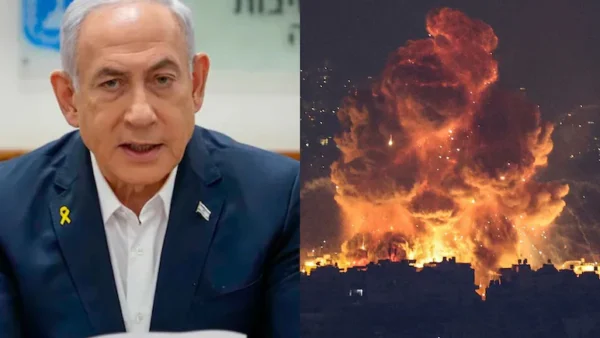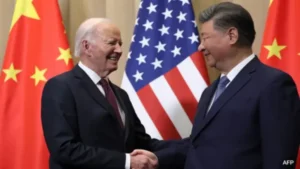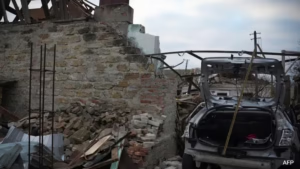
Hezbollah's leadership has faced major setbacks in recent weeks.
New Delhi: Israeli Prime Minister Benjamin Netanyahu on Tuesday issued a stern warning to Lebanon, claiming that the country could end up like Gaza if it allows Hezbollah to operate within its borders. His statement came at a time when the Israeli military has intensified its offensive against Hezbollah on Lebanon’s southern coast, deploying additional troops and advising civilians to evacuate the area.
In a direct video address to the people of Lebanon, Netanyahu urged them to free their country from the occupation of Hezbollah to avoid further destruction. “You have an opportunity to save Lebanon before it falls into the abyss of a long war that will lead to the kind of devastation and suffering seen in Gaza,” he said. The warning was clear: unless Hezbollah is dealt with, Lebanon could suffer the same fate as Gaza, which has seen widespread devastation due to the ongoing conflict.
“I say to you, the people of Lebanon: rid your country of Hezbollah so this war can end,” Netanyahu said.
Hezbollah hits back
The conflict between Israel and Hezbollah escalated after the group claimed responsibility for firing rockets at the Israeli port city of Haifa. The attack came after the Israeli military reported that 85 projectiles crossed the border from Lebanon into Israel. Hezbollah, which has shown no sign of giving up, has threatened to continue firing on Israeli cities and towns if Israeli attacks continue on Lebanon’s populated centers.
The conflict has been going on since October 7, 2023, when Hamas launched a devastating attack on Israel that killed more than a thousand civilians. Since then, Hezbollah, a key Hamas ally, has been engaged in sporadic exchanges of fire with the Israeli military. Meanwhile, Israel has vowed to secure its northern border and protect its citizens from Hezbollah’s rocket attacks.
Hezbollah’s leadership in crisis
Hezbollah’s leadership has suffered major setbacks in recent weeks. In late September, Israel killed its leader, Hassan Nasrallah, in an airstrike on Beirut. Nasrallah had led Hezbollah since 1992 and was considered one of the most powerful figures in Lebanon. His death dealt a blow to the group, but Israeli attacks did not stop there. In October, Israel launched another bombing campaign in Beirut, targeting Hashem Safieddine, a senior Hezbollah figure widely considered to be Nasrallah’s successor.
While Hezbollah has not confirmed Safieddine’s death, Netanyahu indicated in his video address that both Nasrallah and Safieddine had been killed.
Netanyahu said in his address that Israel had “undermined Hezbollah’s capabilities; we have killed thousands of terrorists, including [longtime Hezbollah leader Hassan] Nasrallah, and Nasrallah’s replacement, and his replacement’s replacement.”
IDF spokesman Daniel Hagri said, “We attacked Hezbollah’s intelligence headquarters in Beirut… This is the headquarters of the head of intelligence, Abu Abdullah Mortada.” “With that, we know that Hashem Safieddine was there. The consequences of this attack are still being investigated, Hezbollah is trying to hide the details. When we know, we will update the public.”
Israeli strategy
Having already targeted strongholds in southern and eastern Lebanon, Israel’s latest moves mark a shift towards coastal areas, with civilians being urged to evacuate. On its Telegram channel, the Israeli military confirmed that the 146th Division has begun “localised, targeted operational activities” in southwestern Lebanon, with Hezbollah’s infrastructure as its direct target.
The Israeli Defence Forces (IDF) have not spared Beirut either, launching attacks targeting Hezbollah strongholds in the city’s southern suburbs. The area is a major base of Hezbollah operations. Israel has since destroyed Hezbollah tunnels leading into Israeli territory.
Hezbollah maintains its stance
Despite these losses, Hezbollah has maintained its stance. Its deputy leader Naim Qassem declared that the group’s military capabilities remain intact and they are prepared for a long conflict. Qassem’s statement came after Israeli Defense Minister Yoav Galant described Hezbollah as a “broken organization” whose leadership had eroded following the elimination of Nasrallah.
Galant spoke about the impact of the Israeli attacks, claiming that Hezbollah’s command structure was in disarray and the group lacked leadership following the death of Nasrallah and other key figures. He also pointed out that Hezbollah’s firepower had been significantly reduced thanks to Israel’s concentrated military campaign. However, Hezbollah maintains its presence along the Lebanese border.
Iran’s shadow
The conflict is not limited to Israel and Hezbollah. The group is believed to be backed by Iran, which provides it with arms, funding and political support. Israeli forces have clashed with Iran-backed militias throughout the region, including in Syria and Yemen. Just this week, an Israeli airstrike in Damascus targeted a building used by Iran’s Revolutionary Guard and Hezbollah, killing seven civilians, according to Syrian government reports.
Israel has also accused Hezbollah of using civilian areas as shields for its military operations, a tactic that has been widely condemned. In turn, Hezbollah has pointed to the heavy civilian death toll in Gaza as evidence of Israel’s indiscriminate use of force. The humanitarian crisis in Gaza is dire, with nearly all of its 2.4 million residents displaced at least once due to Israeli bombing.
Tehran has long been a major supporter of Hezbollah. However, there have been reports in recent weeks that Iran is seeking a ceasefire in Lebanon, possibly as a result of Hezbollah’s increasing losses.
Iran’s Foreign Minister Abbas Araqchi visited Beirut on Friday and expressed support for a ceasefire, but stressed that any agreement must be backed by Hezbollah.

Continuing the achievement of the journey of effectiveness and credibility of more than 10 years in the career of journalism, as a woman journalist, I am Serving as the founder, promoter and editor of DiaryTimes with the trust and support of all. My credible coverage may not have given a big shape to the numbers, but my journey presents articles that make you aware of the exact and meaningful situations of Himachal’s politics, ground issues related to the public, business, tourism and the difficult geographical conditions of the state and financial awareness. DiaryTimes, full of the experience of my precise editorial expertise, is awakening the flame of credible journalism among all of you, so that the eternal flame of meaningful change can be lit in the life of the people of the state and the atrocities being committed against the people can be brought to the fore, I am motivated for that. If even a small change comes with the power of my journalism and the whole world becomes a witness to that issues, then I will consider myself fortunate.








